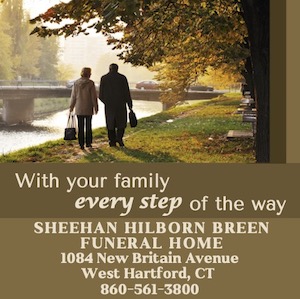
Alison Schwartz, 29, was People magazine staffer
(JTA) – When Alison Schwartz set out to find a gift for her best friend’s wedding in 2018, she did it with her trademark creativity and fastidiousness.
The idea was to make a 42-square-foot quilt with all 1,450 words of the couple’s wedding vows hand stitched on the underside. But Schwartz was a perfectionist, and when the quilt arrived with an error, she sent it back. And then sent it back again when the second attempt also fell short. It took a year, but she finally delivered Jared Misner and his husband the finished product – devoid of errors.
“That encapsulates Alison in multiple ways,” said Misner, who has known Schwartz since they were freshmen at the University of Florida. “She gave this quilter the same amount of slack she would have given herself, which is to say zero. She was a wonderfully compassionate and ruthless editor. And she was the most generous gift giver you can imagine.”
A New York native, Schwartz, who died April 28 of COVID-19 at the age of 29, grew up in Wellington, Florida, just outside West Palm Beach. A journalism major, a summer internship at People led to a full-time job offer, and Schwartz worked her way up to become director of digital platforms. Colleagues remembered her as a gifted writer and a joyful colleague.
But it was her thoughtfulness and care for her friends that stood out. One of the last things she did before going into the hospital was send a gift card to a college roommate who works as a nurse in Florida, which the roommate then used to buy masks for her hospital staff. During one of the few moments of consciousness while she was in the hospital, she wrote a message on a chalkboard to tell a friend that she hadn’t forgotten her birthday, Misner said.
Schwartz is survived by her parents, Robin and Richard Schwartz, and a brother, Adam. A scholarship was established in her memory at the Dreyfoos School of the Arts in West Palm Beach.
Atty Lee Kozol, 87, represented the Patriots
BOSTON (JTA) – Lee Kozol, who died on April 24 of COVID-19 at the age of 87, had a legal career that spanned some six decades, and he was at the center of many of the important issues of his day.
A graduate of Harvard Law School, in the 1960s he served as head of the civil rights division in the Massachusetts attorney general’s office, where he oversaw the state’s implementation of the U.S. Supreme Court decision barring prayer in public schools. Back in private practice, he successfully persuaded the state’s highest court that lead paint should not be excluded from pollution controls. And in 1988, he and his brother Joel, also a Harvard Law School grad, represented the New England Patriots in the team’s 1988 sale.
Even in retirement, Kozol remained a force, leading his condominium’s headline-making effort to block one of the city’s major real estate developers from erecting a massive tower along the Boston waterfront.
“He was one of the smartest people I have ever known,” said Diane Rubin, an attorney who got to know Kozol in her role representing the condominium, Harbor Towers. Rubin described Kozol as a great mentor, eloquent and modest.
Kozol was born in Brookline, Massachusetts, in 1933. After law school, he clerked for Judge William Hatie at the U.S. Court of Appeals for the Third Circuit. In 1963, he was appointed chief of the civil rights division by Attorney General Edward Brooke, who went on to become a U.S. Senator.
In addition to wife, Gail, Kozol leaves three daughters from his first marriage, and four grandchildren.
Aaron Rubashkin, 92, patriarch of troubled kosher meat empire
(JTA) – As a child in the Russian town of Nevel, Aaron Rubashkin saw his Jewish school shut down by the Soviet government in 1938. After the Nazis arrived in the summer of 1941, the Rubashkin family fled on foot, landing in Uzbekistan before finally arriving in the United States in 1953.
So it was perhaps not surprising that in 2008, when hundreds of federal agents descended on the tiny Iowa town where his family operated what at the time was the largest kosher meat producer in the United States, Rubashkin saw it as another case of government mistreatment.
“Everything is a lie,” Rubashkin said of the misdeeds alleged against the company, Agriprocessors, chiefly that it was employing hundreds of undocumented workers. “We are ethical people. We don’t do no injustice to nobody, not to a cat.”
Rubashkin, who died April 2 of COVID-19 at the age of 92, was not the face of the scandal that would eventually lead to the company’s sale to an Orthodox Canadian billionaire. That was his son Sholom, who despite the swirling allegations against the company, would be convicted only of financial fraud and sentenced to 27 years in prison, of which he served eight years before President Trump commuted the sentence in 2017.
But Rubashkin felt the pain of the controversy acutely. It was he who had gotten the family into the meat business in Borough Park, Brooklyn, in 1953. And it was he who had purchased the Iowa plant in 1987, transforming the way kosher meat was produced and distributed in the United States. And it was his name that adorned the Aaron’s Best brand that Agriprocessors produced.
In the Chabad Hasidic community, Rubashkin was known less for his business controversies than his many acts of kindness. A lengthy obituary on the Chabad.org website detailed the stories of Rubashkin’s generosity that have become the stuff of legend. Crown Deli, which the family opened on 13th Avenue in Brooklyn, effectively functioned as a soup kitchen, feeding anyone in need.
Rubashkin is survived by his wife, Rivka, and nine children.
Jeffrey Sanderson, 62, took pleasure in the small things
(JTA) – For Jeffrey Sanderson, it was the small things in life that brought the most joy.
He couldn’t get enough of old episodes of “I Love Lucy,” and “Leave it to Beaver,” which tickled his sense of humor. And always, sharing jokes with his family was sure to set off fits of laughter.
Sanderson died on April 18 of COVID-19. He was 62 and lived in a group home for people with intellectual disabilities in Lynnfield, Massachusetts.
“He was the most endearing person,” said his twin brother, Jay Sanderson, the CEO of the Jewish Federation of Los Angeles. “He was funny, he was charming. The things he loved, he really loved. He had such joy for little things.”
The Sanderson brothers grew up on the North Shore of Boston. Just before their fifth birthday, their father died of a heart attack. It was not long after Jeffrey had moved out of the family home for the intensive caretaking he required.
After moving to Los Angeles, Jay Sanderson made frequent cross-country trips to visit his brother and mother, who remained in the area until last summer, when she relocated to a senior residence in California.
Because of the pandemic, Jay Sanderson had to inform his mother by phone that Jeffrey had died, even though his mother lives only three miles away.
“I couldn’t comfort her or hug her over the loss of her son,” he said.
Jay Sanderson credits his brother with teaching him about kindness and empathy, lessons that shaped his personal and professional life.
“He taught us how to care for others, how to love without judgment and how to appreciate the little things,” Jay wrote in a letter to friends.
“I do what I do because of him,” said Jay’s son Jonah, a rabbinical student.
“He had the most beautiful neshama,” Jonah said, using the Hebrew word for soul. “He was the most beautiful soul you’d ever see.”
Jeffrey Sanderson leaves his mother, Rhoda Sanderson; brother Jay and his wife, Laura Lampert Sanderson; nephew Jonah and niece Isabelle.








 Southern New England Jewish Ledger
Southern New England Jewish Ledger










